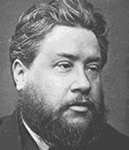 Charles H. Spurgeon
Charles H. Spurgeon
“Ahithophel put his household in order and hanged himself.” (2 Samuel 17:23)
I desire to call your attention to the text on account of its very remarkable character. “He put his house in order and hanged himself.” To put his house in order showed that he was a prudent man: to hang himself proved that he was a fool. Herein is a strange mixture of discretion and desperation, mind and madness. Shall a man have wisdom enough to arrange his worldly affairs with care, and yet, shall he be so sapless as to take his own life afterwards? Strange incongruity, he makes his will, and then because he cannot have his will, he wills to die. Marvel not at this one display of folly, for I shall have to show you that the case of Ahithophel is in the spirit of it, almost universal.
See before you then, the portrait of an attentive servant. He is faithful to his employers, and fulfils well the office to which he is appointed. He is up with the lark, he toils all day, he rests not till his task is done; he neglects nothing which he undertakes. I see him among the throng, I will single him out, and talk with him. You have been engaged for years in farming. You have ploughed, and sown, and reaped, and gathered into the barn, and no one has done the work better than you; and yet, though you have been so careful in your labour, you have never sown to the Spirit, nor cared to reap life everlasting. You have never asked to have your heart ploughed with the gospel plough, nor sown with the living seed, and the consequences will be that at the last you will have no harvest but weeds and thistles, and you will be given over to eternal destruction.
Look ye now to another picture – The prudent merchant. I must briefly sketch him. He knows the ways of trade, studies the state of the market, is quick to perceive the opportunity of gain, has been cautious in his speculations. He prides himself in a quiet way upon the prudence with which he conducts all his worldly transactions – and, my dear friend, I am sure I am glad to see you prudent in business. But I want to ask you if you are thoughtless about religion how it is that you can be so inconsistent? Do you study how to buy and buy well, but will you never buy the truth? Do you put all that you get into a safe bank, but will you never lay up treasure in heaven, where neither moth nor rust doth corrupt? You are wary in your speculations, but will you play so deep at the game of “hazard” as to jeopardise your soul? Is gold your God?
A third photograph shall now be exhibited – The diligent student. He seeks out the best of books to assist him in the pursuit of his branch of knowledge; he burns the midnight oil. Knowledge is sweet, and the honour of being associated with the learned is coveted. My young friend, I would not for a moment abate your zeal, but I would beg space for one consideration worthy of immediate attention. Ought the best of sciences be left to the last? Should self-knowledge and acquaintance with God be treated as a secondary importance? Should not the Word of God be the chief volume in the wise man’s library? With all your gettings, should you not get the wisdom that comes from above, and the knowledge which is the gift of God, and which will introduce you, if not among the learned, yet among the gracious?
The last of my crayon sketches is one which may concern many; it is that of the outward religionist who yet is regardless of his own soul. It is the oddest and strangest of all facts that there should be such people. You are like those builders who probably helped Noah to build the ark and then were drowned. You keep God’s Sabbaths, and yet you will not enter into his rest. You sing Christ’s praises, and yet you will not trust him. You bow your heads in prayer, and yet you do not really pray. You are even anxious sometimes, and yet, that which would end all your anxiety – namely, submission to the gospel of Christ – you will not yield to. Why is this? Wherefore this strange behaviour? Will you bless others and curse yourselves?
I speak to the whole of you who as yet have not believed in Jesus – what is it that you are destroying your souls with? Every unbeliever is an eternal suicide; he is destroying his soul’s hope. What is your motive?
You may be very wise, and you may arrange your business cleverly – but for all that, you are no wiser than the great fool of my text, who “set his house in order, and hanged himself. “God teach us to be wise, before this year is yet gone.”
Amen
